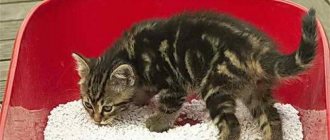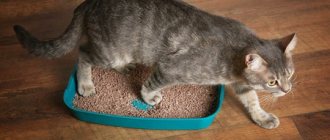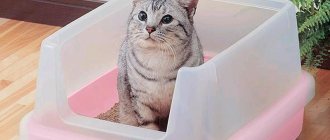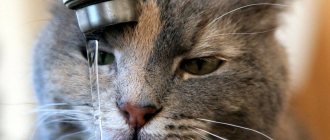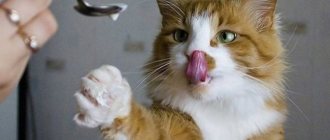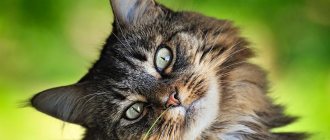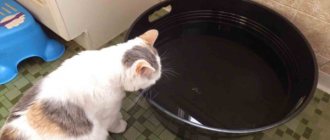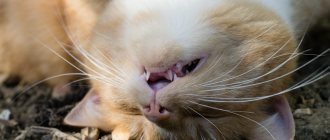The relationship between a cat and its litter box can rarely be called simple. Usually, owners need to put a lot of effort into pointing the kitten to a suitable place to relieve itself. It also happens that an animal, already accustomed to its toilet, suddenly refuses it and chooses a new place to empty its bladder. Pet owners see the reason for such a change in mood in their capriciousness, effeminacy and other mortal sins, while a variety of prerequisites can be hidden behind such behavior. We will talk further about why the cat stopped going to the litter box and how to help him find his way back.
The cat stopped going to the toilet
What to do if your cat avoids the litter box
Cats avoid the litter box for a number of reasons. This can happen to adult animals that have relieved themselves in the right place for a long time.
Cats avoid the litter box for a number of reasons.
Many factors can contribute to such behavioral disturbances. Before contacting a specialist, look for the cause on your own.
What to do if your cat avoids going to the right place:
- Replace the location of the cat litter box.
- Change filler manufacturer type.
- Place the second device in a different place, nearby.
- Analyze your pet's diet: perhaps the reason is a change in it.
- Carefully remove the filler around it, do not use detergent with a strong smell.
- Change the smell in the room where the box is located.
- Determine whether the animal may be experiencing stress for a number of reasons (moving, a new animal in the house, a new owner, etc.), give sedatives or time to adapt.
- If there is another animal in the house, buy an additional tray.
- Do not cut your pet's nails: this may make it uncomfortable for him to go into the litter box.
- If surgery has taken place, wait until the cat recovers.
If your pet relieves itself after eliminating possible problems and applying these tips, you should contact the clinic for a doctor’s examination.
Possible problems with urination and defecation in kittens
A small kitten must be properly cared for so that it can develop and grow normally. If he is separated from his mother and finds himself in the house of a new owner, then the adaptation period may be accompanied by stress. A number of negative factors can affect the weakening of an animal’s immunity. This affects the functioning of all body systems. Absence or problems with urination and bowel movements during this period are quite acceptable.
When the kitten has grown up and settled down, has become the owner of an excellent appetite, but does not go to the toilet properly, it is worth wondering if everything is okay with him.
Constipation in a kitten
The following disorders can cause constipation in kittens:
- Stressful state. Stress can be triggered by a variety of factors. For example, a visit to the veterinarian, the presence of other animals in the house. However, the most common is a change of residence. The kitten may not have a bowel movement for two to three days. Then everything returns to normal.
- The cat was separated too early. During this period, when the kitten misses its mother's closeness, the absence of stool may last for 4–5 days. If after this period the situation does not change, then you should seek help from a specialist.
- Wrong diet. If the baby ate natural food before he got to his new home, then you cannot suddenly switch him to dry food. Constipation in a kitten can be caused by too much protein in the diet.
- Worms. Intestinal parasites can cause intestinal blockages. This is a dangerous condition that requires medical attention.
If your baby cannot have a bowel movement for more than five days, he needs help. There are a number of recommendations:
- Microclyster. The procedure is allowed if there are no contraindications, that is, if constipation was caused by an unbalanced diet, and not by a violation of the digestive system.
- Enzyme preparations. Prebiotics can be given to a kitten only after prior consultation with a specialist. Mild laxatives prescribed by a veterinarian may also help (medicines for humans are not suitable).
Enzyme preparations must be prescribed by a veterinarian
- Oils. You can add a few drops of oil to your baby's food. Vaseline is the best option, since it cannot be absorbed into the gastrointestinal tract and does not overload the animal’s liver.
I recently learned about Vaseline oil for cats, but have already tried it. You only need a little bit of it, it’s completely unnoticeable with the kitten’s food. But it helps him go to the toilet, like a mild laxative. But others are not recommended to replace it. The same olive oil is absorbed into the gastrointestinal tract and adversely affects the liver.
Sometimes, as a proven old-fashioned method, it is recommended to use baby soap (a small piece is inserted into the kitten’s anus to irritate the walls of the rectum), but it is still recommended to choose more humane ways to help the pet (the same condensed milk will help less painfully).
Frequent stool
When a kitten suffers from diarrhea, this is a sign of a serious malnutrition problem. This situation will require urgent measures and treatment. The entire course of therapy must be carried out under the supervision of a veterinarian.
The most common reason is a change in diet. If the kitten does not receive its usual food, diarrhea occurs. It is necessary to return to your previous diet as quickly as possible.
Changing a kitten’s diet should not be abrupt; it is carried out according to a certain scheme.
There are other reasons for frequent bowel movements in kittens:
- Binge eating. Food that comes in large volumes cannot be digested normally and enters the intestines in liquid form. It is important to control kittens' portions according to their age.
- The food is not suitable or bad. You cannot feed your kitten pickled, fried, salted, or expired foods. This food is not suitable not only for kittens, but also for adult cats. It is not absorbed and causes diarrhea. Also, cats are not given food from the owner’s table (primarily because it contains salt, sugar or spices); food for animals must be prepared separately.
- Allergies or intolerances. Often kittens cannot digest or assimilate fatty fish, beef, and corn. It happens that some elements cause an allergic reaction.
- Poisoning. This phenomenon can be caused not only by food, but also by various substances. A kitten, due to its curiosity, can fit anywhere. Therefore, household chemicals and other chemical elements should be stored out of reach. If the baby is poisoned, then vomiting and lethargy will be added to the diarrhea. Only a specialist can help here.
- Parasites. The first and obvious sign of a kitten being infected with worms is diarrhea with mucus. Only medications can help here. If the case is advanced, then the help of a veterinarian is needed.
- Diseases. The cause of diarrhea can be infectious lesions in the body of a small pet.
Determining the causes of diarrhea
To get rid of the problem of frequent bowel movements, you need to find out its cause. To do this, you need to conduct a stool analysis. Factors of color, consistency, and impurities play a role here:
- Stool with a yellow tint will indicate that the kitten has been poisoned by some kind of food.
- If the feces have an admixture of blood or mucus, then this speaks in favor of helminthic infestation.
- Brown diarrhea indicates an allergic reaction.
- If the stool has a green tint and a persistent unpleasant odor, then the kitten has been poisoned by chemicals.
How to help a kitten with diarrhea
If loose stools have become a one-time occurrence, and the kitten feels normal, that is, he is alert and does not have a fever, then you can simply give the baby plenty of water and put him on a diet. The food restriction should continue for several days until everything returns to normal. In addition, you can give your pet a quarter of a tablet of activated carbon. If diarrhea is prolonged, accompanied by a deterioration in general condition, then an urgent visit to a doctor is necessary. He will be able to diagnose the cause and prescribe treatment.
Video: kitten has diarrhea - what to do
Urination in kittens: normal and abnormalities
In order to determine how often a kitten pees, you need to track how often it drinks water. The amount of fluid you drink should correspond to the amount of urine. An older kitten will empty its bladder up to 5 times a day. The process does not cause discomfort to the baby. Urine should be clean and transparent without any admixtures of blood or mucus.
No urination
If a kitten pees little or does not pee at all, there may be a number of reasons for this:
- suffered stress;
- diseases of the urinary tract;
- kidney disease;
- small amount of fluid consumed;
- exhaustion.
Also, the kitten may not visit the litter box if it is dirty, he does not like the litter, etc.
Many cats are very picky about the cleanliness of the litter box and the contents in it.
If the baby does not pee for a long time, and the owner notices weakness and apathy, lack of appetite, irritability, then you should urgently contact a veterinarian to establish a diagnosis and begin timely treatment.
No matter how many cats and kittens appeared in my house, during the first 24 hours no one peed or pooped. When entering a new home, any animal experiences stress. We understand that he will feel good here, no one will offend him. The cat is not sure about this yet. Therefore, she has no time to relieve herself. She should investigate everything and calm down.
Frequent urination
One of the reasons for frequent urination is the common cold. It can occur due to a draft or lying on a cold surface for a long time. A cold provokes the occurrence of cystitis - inflammation of the mucous membrane of the bladder, as a result of which its contractility is impaired. Cats, like humans, experience frequent urges to urinate, but the amount of urine may be small. the pet also experiences pain when urinating, which can be manifested by meowing.
Frequent urination can also result from:
- impaired metabolism;
- insufficient protein content in the diet.
You should not miss the moment when the kitten becomes a teenager and begins puberty. At this time, he may begin to mark his territory, so he pees more often.
Video: Frequent urination in cats
Rare urination
If the kitten pees rarely or does not pee at all, then this may indicate:
- congenital injury or congenital defect of the urinary system;
- atony of the bladder (weak contractility);
- injury or rupture of the bladder;
- spinal cord injury;
- development of tumors in the genitourinary system.
Anuria (absence of urination for more than a day) leads to dehydration, which can cause death in a kitten. Therefore, any suspicion of urinary problems should be a reason to consult a veterinarian.
Typically, diseases are accompanied by additional symptoms that are difficult to miss.
Lack of urine due to moving to a new place is quite acceptable, but the animal requires monitoring. If you do not urinate for more than 1.5 days, consult your doctor.
The cat does not go to the litter box: the reasons why this happened
There are several main reasons why a cat walks past the litter box. Each problem has its own solutions.
Be sure to read:
When kittens start going to the toilet, how to understand that the kitten wants to go to the toilet
Medical reasons why the cat stopped going to the litter box
There are several medical reasons why a cat does not go to the litter box:
- Hormones. An unneutered cat will often prefer to mark territory rather than pee in a designated area. The use of traditional weaning methods, special medications or castration will help solve the problem.
- Diseases. Some illnesses cause pain during bowel movements or even prevent you from going to the toilet normally. These include intestinal inflammation, colitis, hepatitis, cystitis, urethritis, urolithiasis, etc.
- Elderly age. Cats over 7 years old often have problems with urination or defecation: urinary or fecal incontinence, etc.
In this case, consultation with a veterinarian is required.
Behavioral reasons
After ruling out health problems in your pet, you need to pay attention to behavioral characteristics.
There are several main reasons why a cat walks past the litter box.
Each animal has character traits, habits, and preferences. Changing external conditions leads to discomfort.
Motives:
- One more tray is missing. Cats are clean animals. One device may not be enough for them. The house should have one box with litter for the cat + another one in reserve.
- Stress. If your pet has recently had to live next to new animals, he experiences discomfort. Time needs to pass. It is advisable to help relieve stress in your pet: the trays should be different and placed in separate rooms.
- Inconvenient tray. Cats love comfort. The cat litter should be selected based on the size of the animal. High sides prevent burying and provide convenient placement.
- Consequences of recent illnesses. If your cat has recently suffered from cystitis or constipation, the litter box is associated with pain and discomfort.
- Unpleasant smell. The aroma in the room or the litter itself can repel the animal.
- Changing the filler. After changing the type or manufacturer of litter, the cat will stop going to the litter box if she doesn’t like it.
- Unpleasant conditioned reflexes associated with the toilet. Pets often scatter litter around the toilet. This behavior is inherent in nature; animals “bury” their feces. Sometimes owners begin to scold their pet for “garbage.” Such methods of education lead to the fact that he completely stops visiting the litter box.
Important! During heat, cats often refuse to use the litter box due to the inconvenience. Males do not go there in small ways, as they mark the territory.
Prevention of lack of stool in cats
To prevent cats from having defecation retention, preventive measures must be taken. Firstly, you need to review the animal’s diet and pay attention to what the pet eats during the day. You should not feed your pet from the table. A cat who eats food of excellent quality does not suffer from stool retention. When the owner gives him natural food, he needs to create a diet that contains meat and vegetables. If a cat eats steamed bran, it has a good effect on the functioning of the digestive system.
Cats are fairly clean creatures who always willingly take care of their fur. To prevent your cat from swallowing it, you need to do regular brushing. Pet stores also have products that help remove hairballs from the gastrointestinal tract.
As a rule, neutered cats tend to have a recumbent lifestyle. The less the pet moves during the day, the worse it goes to the toilet. When an animal is given balls, toys, climbing machines, and taken for a walk, then, as a rule, he does not have problems with peristalsis.
The cat does not go to the toilet at all - reasons and solutions
Complete refusal mainly has medical reasons. But behavioral factors also influence the problem. Under severe stress (for example, moving), the animal may not completely defecate for two days.
Be sure to read:
How to remove the smell of cat urine: products for removing acrid odors from pets
In the absence of health problems, sooner or later this will happen. If not, this is a signal of serious violations.
Why does a cat refuse to walk small?
If the animal does not go to the toilet at all, you need to look for medical reasons. At the same time, the pet's behavior changes.
If the cat does not go to the toilet at all, you need to look for medical reasons
Vanity, uncertainty, and causeless meowing appear. There is pain in the area where the bladder is located.
Causes:
- Drinking a small amount of water is the culprit in the formation of stones and insufficient urine output.
- Excessive consumption of meat and fish provokes problems with urine output. A large amount of protein in the diet causes edema and fluid retention.
- A neutered adult pet does not walk much due to high weight, lack of activity, and movement.
- A problem that requires an immediate visit to the veterinarian is a congenital anomaly of the urinary system.
- Often, eating dry food causes the problem. You need to give more fluid.
- Provokes refusal to use the toilet or rare urination: cystitis, kidney inflammation, urolithiasis, sand in the urine.
In a big way
Normally, an adult pet should go to the toilet more than once a day. Minor deviations are allowed. If the cat does not defecate for more than 4 days, you need to contact a veterinarian.
Normally, an adult pet should go to the toilet more than once a day.
What are the reasons:
- The most common factor in stool retention is poor nutrition, lack of normal amounts of fiber, fluid, and bones.
- The cat refuses to go to the toilet due to a sudden change in the situation, the presence of strangers, or pets.
- A large amount of fur in the pet's stomach. Cats lick the fur with their tongue, it remains in lumps in the body. With proper nutrition, the leftovers come out on time, without clumping into large lumps. For this purpose, animals eat grass.
- Insufficient activity leads to infrequent bowel movements.
- As cats age, their gastrointestinal tract works slowly and intermittently.
- Diseases of the intestines and other nearby organs.
In what cases should you consult a veterinarian?
Sometimes in kittens the development of bowel and bladder emptying is accompanied by disturbances. Deviations from the norm can be a symptom of serious problems with the internal organs of a small four-legged pet. You can recognize them in time by:
- constant monitoring of the baby’s behavior during defecation and urination;
- assessing the consistency, color and odor of urine and excrement;
- analysis of the frequency of bladder and bowel movements.
Re-training to the tray: the best ways
Re-training a cat to the litter box is no different from training a kitten. Everything will have to start again.
Be sure to read:
Wood litter for cat litter: types, the best companies, how to use, pros and cons
What to do:
- Even if the reasons for a cat’s refusal to use the toilet are medical, then after solving them it is important to pay attention to the behavior and emotional state of the animal. Provide a comfortable place to sleep and rest. The cat should feel confident and protected. It is advisable to purchase a special house.
- If an animal walks small and large, but not where it should, then it does not like the place chosen by the owner. You can first place the tray in the place that your pet has chosen, and then slowly move it daily to where you need it.
- If the cat went to the right place, be sure to praise him. It is important to give your pet enough attention that a family can give.
- Limit your pet's access to a large number of rooms in the apartment.
- The smell of shoes often provokes animals to go to the toilet in their shoes. Put your shoes in the closet.
- Decide what shape the animal likes and what filler is preferable.
- After each meal, take the animal to the tray. You can sit next to him until he finishes important things.
If the cat has stopped going to relieve itself in the right place, you need to pay attention to its physical and emotional state. When changing the tray, environment, or toilet location does not help, you need to contact a veterinarian.
Important! Refusal to use the toilet is often a consequence of health problems.
How can you tell if your kitten is constipated?
Constipation can be expressed not only in the absence of stool. This factor can be missed if the pet has access to the street and defecates there. What are the signs that indicate that a kitten is constipated?
- Frequent but unproductive attempts to go to the toilet.
- The kitten meows when it tries to empty its intestines, walks around the tray for a long time and is afraid of it.
- Dry, hard, small stools.
- Mucus or blood in the stool.
- Lack of appetite.
- The kitten does not lick itself, is lethargic, has lost weight.
- A small amount of liquid feces after the kitten has been pushing for a long time.
